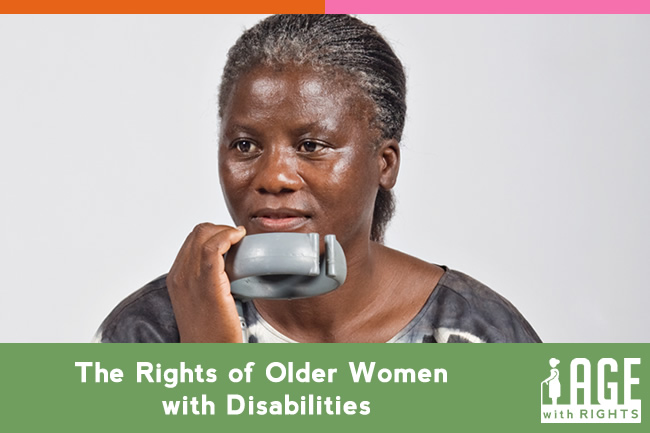The Rights of Older Women with Disabilities
Research shows that older persons in general are often subjected to different forms of violence and discrimination on the basis of age. They are also isolated, abused and regarded as unproductive and burdensome members of society - a phenomenon known as ageism.

Discrimination against older persons is quite often compounded or aggravated by different factors such as sex and age. When these characteristics exist in the same individual the result is that the person faces a multiple axis of discrimination. For example, researchers have noted that older women face a “triple jeopardy” on the basis sex, disempowerment and age. The likelihood of older women to be poor, widowed, to suffer violence and be burdened with caring for grandchildren and ill relatives is much higher compared to their male counterparts.
Disability is an important factor which can aggravate the discrimination to which older persons are subjected. There is a high rate of disability amongst the older global population, some of which is acquired due to illness in one’s later years. More than 46 per cent of older persons aged 60 years and above have disabilities. This translates to an excess of 250 million people who experience disability in their old age.
Older people with disabilities – particularly women - face multiple layers of discrimination. They face discrimination on the basis of gender, disability, age and disempowerment. The Preamble to the United Nations Convention on the Rights of Persons with Disabilities (UNCRPD) acknowledges the “difficult conditions faced by persons with disabilities who are subject to multiple or aggravated forms of discrimination on the basis of race, colour, sex, language, religion, political or other opinion, national, ethnic, indigenous or social origin, property, birth, age or other status.”
Apart from the UNCRPD, there are various legal instruments which provide expressly for the protection of the rights of older persons with disabilities.
These include:
- The African Charter on Human and Peoples' Rights (Article 18(4),
- The Protocol to the African Charter on Human and Peoples' Rights on the Rights of Women in Africa (article 23),
- Inter-American Convention on Protecting the Human Rights of Older Persons (article 9) and
- The Protocol to the African Charter on Human and Peoples' Rights on the Rights of Older Persons (article 13).
In spite of the rights and protections laid out in these and other legal instruments, older women with disabilities continue to face violence and discrimination, partly because these legal instruments have not been enacted and therefore, have not been used to protect the rights of older women with disabilities. In particular, the Protocol to the African Charter on Human and Peoples' Rights on the Rights of Older Persons which was adopted in 2016 has not yet been ratified. There is a need to ensure ratification of this instrument to ensure that older persons with disabilities are protected and enjoy their fundamental human rights and freedoms.
Additional Resources
- United Nations Convention on the Rights of Persons with Disabilities
- Disability and Older Persons, South African Human Rights Commission
- UNDP, Leave No-One Behind: Ageing, Gender and the SDGs (2016)

